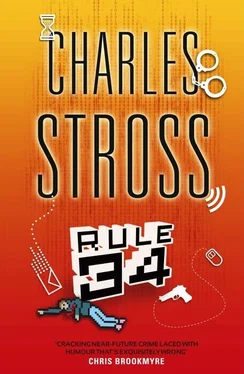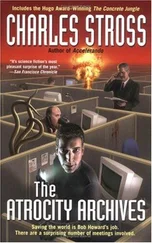“Great, skipper, I could use some help. It’s been one damn thing after another this morning. I’ve got six pending RFIs from some big intelligence investigation CID are running—”
Your heart sinks. “Is it Operation Babylon?” you ask.
“How did you know?” Moxie does his best hamster nose-rubbing imitation at you.
“Meet Operation Babylon’s Europol liaison.” You point at Kemal, who is looking around with an expression that speaks volumes in monosyllables. His gizz turns especially glassy as he spots Moxie’s animated Goatsedance digiframe. (For which you make a mental note to bollock him later: Visiting brass could get entirely the wrong idea.) “It’s a black hole, Moxie, coming to swallow us. What have you got in your queue?”
You settle Kemal down with a seat and a pad, then spend the next ten minutes with Moxie dissecting: a request for information about shrink-wrap fetish clubs in Midlothian; demands that someone in IT Support decode the charge sheet you filed against one Mr. Hussein, A., back in the day (“Conspiracy to Bamboozle the Police,” suggests Moxie, identity-theft charges being confusing to officers more normally accustomed to breach-of-the-peace and public-order offences); an urgent enquiry for a backgrounder on spam filters (you boost that one to Priority A and sling it at your own job queue); a query from the desk sergeant at Gayfield Square as to whether he can arrest someone for running a home-brew fabricator (that’ll be a “no,” then—not without probable cause, and fuck knows how that one slipped into the Babylon queue); and a query about identity theft and a person of interest claiming to be Mikey Blair’s boy-friend who left a DNA sample and a junk identity trail.
(Which is just peachy , because if you dig anything up on the random Mr. Christie and present it to Dickie, he really will have a coronary on the briefing-room floor.)
Kemal clears his throat.
“Yes?”
“I have an update from the office. They have a causal chain for one of our fatalities.”
You would expect the man to look smug at this point, but he doesn’t: haunted, more like. “What?”
Kemal shakes his head. “Vito Morricone. Dead in Palermo. A yahoo-yahoo boy. He died in a kitchen accident.”
Moxie shakes his head. “A kitchen accident?”
“Yes. He was electrocuted by a deliberately miswired food processor.” (You wince: You’ve had cooking incidents like that.) Kemal continues: “It was a high-end machine, able to heat or chill as well as mincing and mixing. Programmable, networked, you can leave cold ingredients in it and switch it on before you leave work, even change recipes remotely. His partner says that it broke eight months ago, and Morricone took it to a back-street repair shop, where they fixed it for him. The case is stainless steel. A replacement part—” He shakes his head.
“What kind of replacement?”
“The report does not explain this thing. But the local investigators report that the fixer bought the replacement-part design online from a cheap pirate shop, not from the manufacturer’s website. It came with installation instructions, which he followed. Once installed, the machine could be remotely induced to short its input power supply through the case.”
You give a low whistle of appreciation: Moxie claps, slowly. “Murder. Smoking gun.”
“Yes, but.” Kemal looks troubled. “The fixer does not appear to know anything. Who supplied the sabotaged component design? And why? The investigating magistrate connected to the same pirate design site and bought the same part: It is apparently harmless. And who sent the signal to activate it? We don’t know yet.”
“But it’s an assassination? A well-planned one.” You snap your fingers. “Tariq Hussein. The vacuum robot.” The IM you got while you were talking to Anwar rises to the top of your mind. “Tariq got things fixed . Anwar said something about a kitchen appliance that’d broken. Huh.” You pull up a memo window. “I want to know who fixed Tariq’s vacuum cleaner and when. Ask Mrs. Hussein about it. And”—the penny drops—“Mr. Blair’s enema machine. Who repaired it last?”
“Minute those to BABYLON,” you tell Moxie. He nods and keyboards it into the intelligence wiki, where some poor grunt will funnel it into Mac’s inbound workstream and Mac (or one of his assistant managers) will assign it a priority level and add it to some other detective’s to-do list. Policing, as with all procedural jobs, expands to fill all the time and consume all the resources available for it. And a job like this one is too big to handle in a half-assed manner.
It’s a point of pride among the former nations of the United Kingdom that the murder clear-up rate is in three sigmas territory, somewhere over 92 per cent; but it takes bucketloads of manpower to get there, and process-oriented management and intelligence-supported work flow and human-resources tracking to keep the minimum investigative team of fifty-plus detectives properly coordinated. Most of the public still believe in Sherlock Holmes or Inspector Rebus, the lone genius with an eye for clues: And it suits the brass to maintain the illusion of inscrutable detective insight for political reasons.
But the reality is that behind the magic curtain, there’s a bunch of uniformed desk pilots frantically shuffling terabytes of information, forensic reports and mobile-phone-traffic metadata and public-webcam streams and directed interviews, looking for patterns in the data deluge spewing from the fire-hose. Indeed, a murder investigation is a lot like a mechanical turk: a machine that resembles a marvellous piece of artificial-intelligence software, oracular in its acuity, but that under the hood turns out to be the work of huge numbers of human piece-workers coordinating via network. Crowdsourcing by cop, in other words.
* * *
(If you’re one of the piece-workers in a mechanical turk—or one of the rewrite rules inside Searle’s Chinese room—the overall pattern of the job may be indiscernible, lost in an opaque blur of seemingly random subtasks. And if you’re one of the detectives on a murder case, your immediate job—determining who last repaired a defective vacuum cleaner—may seem equally inexplicable. But there’s method in my motion, as you’ll learn for yourself.)
* * *
You spend the next two hours with Moxie, churning through queries from Operation Babylon. Part-way through, Kemal disappears (to the toilet, you think at first: then to the briefing room, you decide), returning towards the end. You do lunch in the on-site canteen, communicating in defensive monosyllables: After his contribution from Palermo, he has nothing more to offer you. After lunch, you both attend the afternoon briefing in D31; then you sort Kemal out with a tablet, and he turns out to be surprisingly useful at handling those low-level queries you delegate to him. You update the ICIU shift roster for the next week and attend to another heap of inbound administrivia, before finally clocking off your shift and going home via the hair salon.
Home in your wee flat, you kick your shoes off and hang your jacket, visit the bathroom, and take a good close look at your new hair-do.
It’s always hard to tell for sure at the hairdresser’s, but here you can take your time and not worry about being unduly critical in front of the perfectly coiffured girl with the scissors and the long memory for casual insults from clients. You tilt your head and narrow your eyes and after a minute, you decide that, yes, you can live with it. It’s shorter, but more importantly, it’s regular . As business-like as your choice of footwear. Rest easy: Nobody’s going to be passing sly remarks about your hair-do or your sensible shoes in the canteen behind your back. (Locker-room culture will never die: It just goes underground, as you know to your cost.)
Читать дальше












